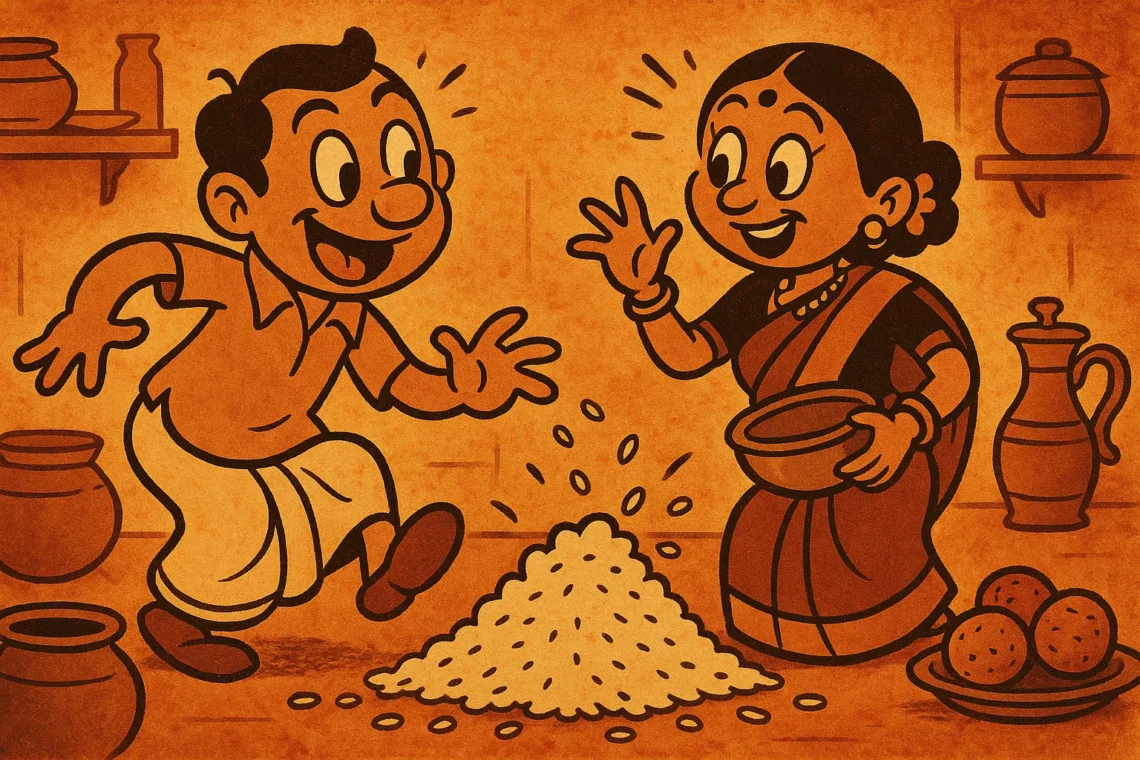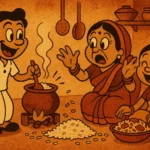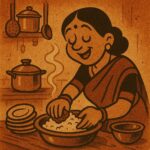It always starts the same way. You’re in the kitchen, maybe you’re distracted, maybe the bag slipped, maybe the container was too full. A small avalanche of uncooked rice hits the floor. And before you can reach for the broom, someone—your mother, your grandmother, your neighbor’s grandmother’s cousin—says it: “Chawal gira? Arey, that’s bad luck!” And suddenly, you’re not just cleaning up grains. You’re cleaning up vibes.
Growing up in a household where rice was both staple and sacred, this wasn’t just a mess. It was an omen. A warning. A whisper from the ancestral hotline. Rice wasn’t just food—it was abundance. It was offering. It was something you measured with cupped hands and reverence, not something you wasted casually between the sink and the stove. So when it spilled, it meant something.
The Myth of Mishap
In many Indian homes, spilling rice is equated with calling in scarcity. It’s believed to displease Lakshmi, the goddess of wealth and grain. I remember my grandmother muttering a quiet “Sorry, Ma” as she swept up fallen rice. She didn’t yell. She didn’t scold. She just gathered it carefully, as if to say, “This was an accident, not an insult.” She’d then toss it near the tulsi plant or feed it to the birds. Always with a gesture of compensation. Like she was patching up an unintentional offense.
And it wasn’t just rice. Lentils, salt, even milk—certain foods weren’t meant to be wasted, because they weren’t just ingredients. They were blessings. You didn’t cry over spilled milk. You apologized to it.
Superstition or Soft Reminder?
Sure, you could call it superstition. But buried under all that folklore is something softer. A quiet ethic. An understanding that food is precious. That someone grew it, harvested it, cleaned it. That grain doesn’t come easy. And so, when it spills, it’s not about punishment—it’s about awareness. About slowing down. Paying attention. Remembering that even a handful of rice has history.
And maybe that’s why the idea of “bad luck” clings to it. Not because the rice gods are petty. But because it feels wrong to be careless with something that feeds you. It’s not fear. It’s reverence, disguised as a frown.
What I Do Now
I live alone in Austin now. My rice lives in airtight containers. My floors are laminate. I’ve spilled rice at least a dozen times. And every time I do, I pause. Just for a second. I still sweep it up carefully. I still feel a twinge of “shouldn’t have done that.” And sometimes—if the mood is right—I toss a few grains outside for the birds. Not because I think Lakshmi is mad at me. But because it feels right to share. To balance the spill with a gesture. To honor something small and white and essential.
So… Bad Luck?
Maybe. Maybe not. But it does mean something. A spilled cup of rice is never just a mess—it’s a moment. A pause. A reminder that food isn’t just what you eat. It’s what you carry. What you respect. What you pass on.
Because in our kitchens, luck doesn’t come from charms or chants. It comes from how we treat what nourishes us. Even when it falls to the floor.
Born in Mumbai, now stir-frying feelings in Texas. Writes about food, memory, and the messy magic in between — mostly to stay hungry, sometimes just to stay sane.












